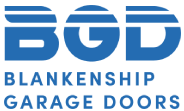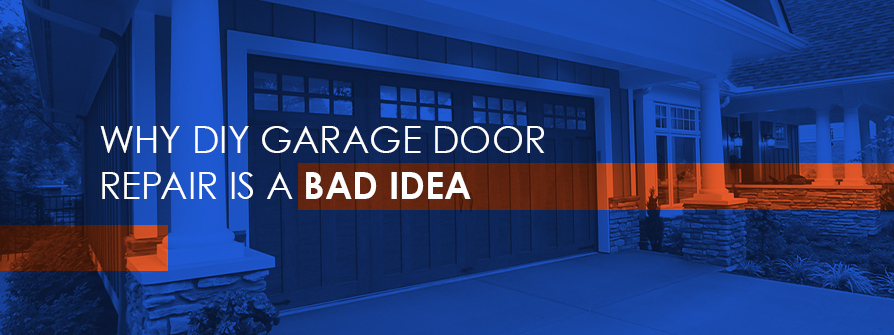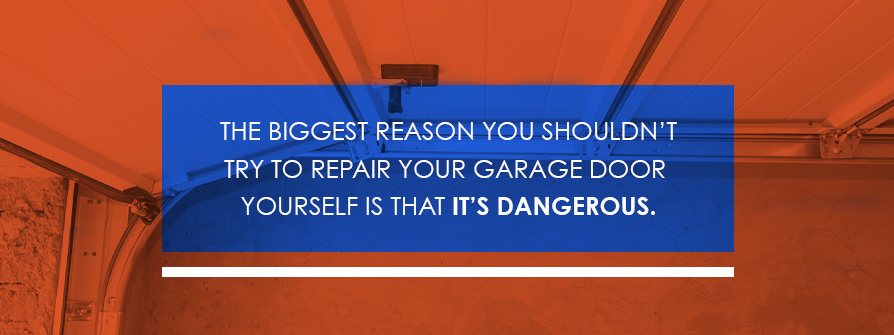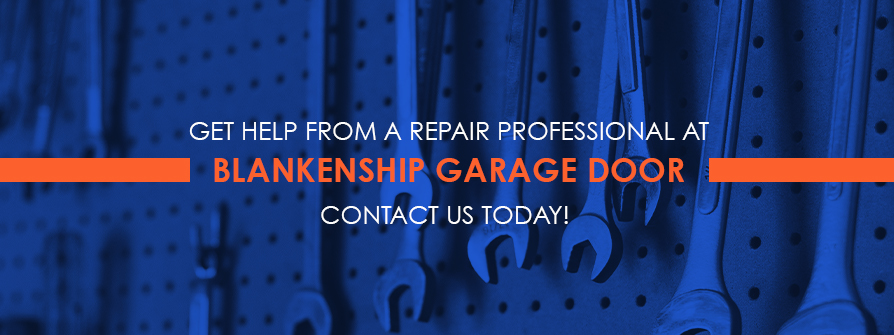Can I Replace a Damaged Panel of My Garage Door?
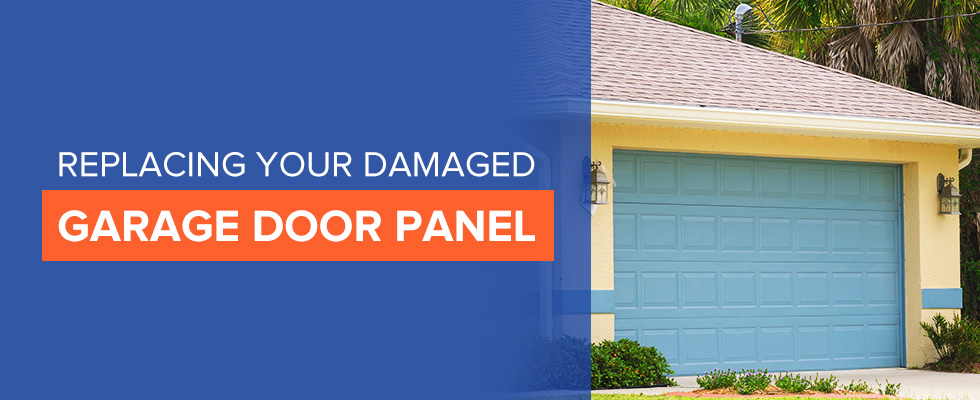
Performing Your Own Garage Door Panel Replacement
Early one morning, you run late for work and don’t have time to make coffee before leaving. Quickly getting into the car and throwing it into reverse, you lose your train of thought for a moment and back the car right into your garage door. Once you gather your thoughts and retreat to safety, you may wonder how you should attempt to fix the garage door.
How to Inspect Garage Doors

A garage door is your home’s largest moving part. Garage doors consist of different components and parts vital to proper and safe functioning. Regularly inspecting your garage doors will ensure that everything continues working as expected, and early detection can help you avoid costly repairs.
How often you operate your garage door dictates how frequently you should check it. If your garage door sees daily use, inspecting it every six months to a year is ideal. Opening and closing the garage door multiple times a day means you should examine it closer to the six-month mark, and you should immediately take a look if you notice any odd sounds or movements.
We’ve compiled a garage door inspection checklist on how to safely inspect your garage door, so you can prolong its lifespan and delay your next door replacement.
Common Garage Door Issues and How to Fix It
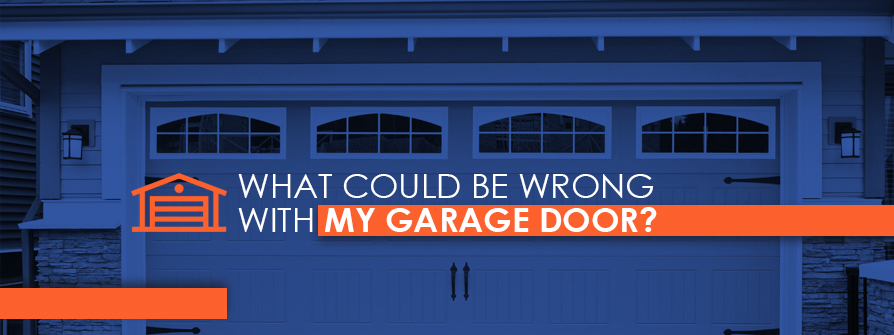
When your garage door isn’t working properly, it can be a major frustration for everyone in the household. Garage doors that won’t open at all, open and close at the wrong times or won’t close all the way — many different garage door issues can cause these problems. Sometimes there are easy fixes you can perform yourself at home if you know what to look for, such as troubleshooting a malfunctioning garage door opener. Other times, it’s best to call in the pros. Let’s go through some simple garage door troubleshooting, so you know when to call for professional help and get your garage door up and running again.
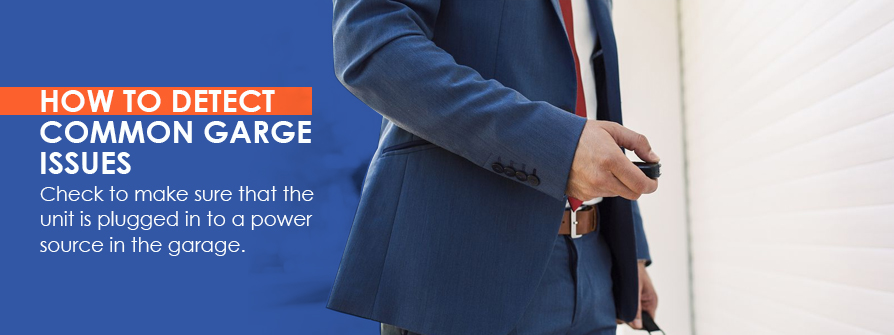
How to Detect Common Garage Issues
If your garage door isn’t working, it could be due to a wide variety of causes. Often, the cause is something simple, so it’s best to start by checking over a few important parts of the garage door to try to determine the problem.
Check to make sure that the unit is plugged in to a power source in the garage. Sometimes, the power cord will accidentally get unplugged, cutting off the power to the whole setup. Next, check your remote and batteries — fresh batteries installed the right way might make all the difference. You can also check to make sure the disconnect switch is not enabled. This is the knob or pull cord you can use to manually open the door when the power goes out, and it sometimes may accidentally get pulled.
Some garage doors, especially older models, have manual locks as an added safety feature. Check to see if your door has a manual lock and if it was accidentally locked. Look for a metal bar about halfway up the garage door.
It may also be that when using your remote transmitter, you may be too far out of range. Many people try to open their garage door from too far away. Try pressing the button right in your driveway to see if it works closer up. Another issue related to the remote is the frequency. If you somehow are on the same frequency as your neighbor’s garage door opener, your door could be opening and closing when they push their remote button. If you suspect this is the case, check your manual for instructions on resetting the frequency.
If the problem is not related to the power source, take a look at the photo eyes. These are the sensors on either side of the door used for detecting if anything is in the way of the garage door — an excellent safety feature when working correctly. However, if the photo eyes are out of alignment or if the lenses are blocked or clogged, they won’t work effectively. Make sure nothing is in the way of the sensors.
Look at the tracks for the garage door and check for any bends or gaps between the rails and rollers, as this can signify a serious issue. Also, check the torsion springs or tension springs and cables. Broken springs often make a loud noise when they break and can be dangerous to work with. If you notice broken springs or cables, call a professional garage door repair company right away. Keep kids away from the broken garage door and park outside until the problem is fixed.
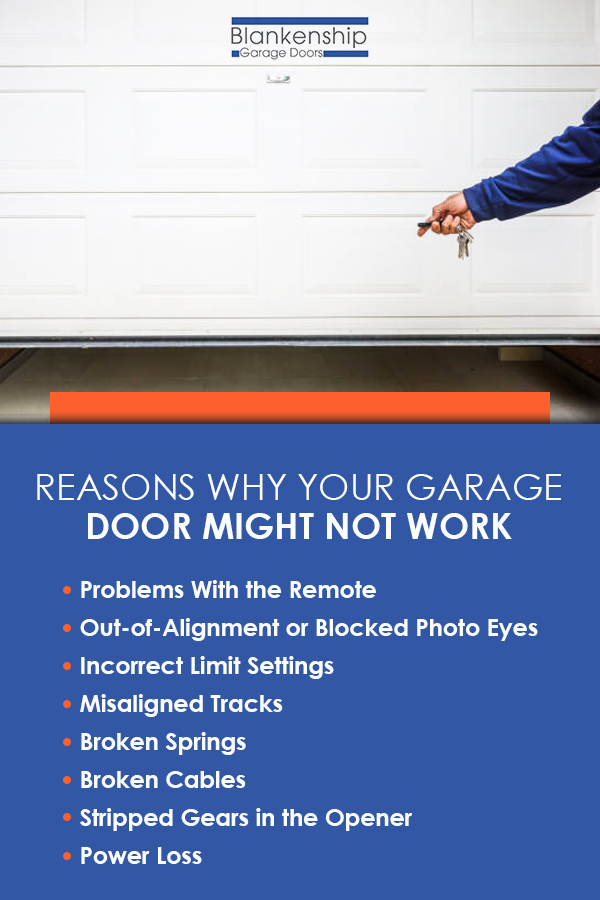
Reasons Why Your Garage Door Might Not Work
Now that you know some common signs to look for to determine what might be wrong with your garage door, let’s cover some common reasons why the door might not work.
1. Problems With the Remote
One of the most common garage door problems — and easiest fixes — has to do with the remote, or transmitter. The remote may be out of battery power or have improperly installed batteries. It also could be out of range of the main unit or on the wrong frequency. If you and your neighbor have accidentally used the same frequency for your garage door transmitters, it could cause problems for you both. Luckily this is a fairly easy fix — check your manual for instructions on changing the frequency or call a pro for help.
If the issue isn’t batteries or frequency, something could be obstructing the signal between the remote and the main unit. The antenna might need cleaning if too much dust or debris has collected. Make sure the antenna is pointed in the right direction and isn’t broken. Also, check around the garage for new growth on trees. Sometimes, branches or other obstructions can get in the way of the garage door signal. You might need to trim some branches to get a clear signal.
2. Out-of-Alignment or Blocked Photo Eyes
Any garage door installation after the early 90s has small photo eyes on both sides of the door entrance. These sensors were developed as a safety feature and may have tiny green flashing lights that indicate they’re working. The photo eyes send an invisible beam to each other to check for anything in the way of the door when it’s closing. If anything is in the way, the sensors will send the garage door back up.
Over time, the sensors can become dirty or clogged, insects could build a nest or web over them or a small item from the garage could simply be in their way. Any of these obstructions keep the photo eyes — and garage door — from doing their jobs. Even if the sensors are clean, the alignment could be off. If they are not aligned correctly, the sensors can’t send signals to each other, and the garage door likely will not be able to close. The photo eyes need to be aimed at each other and placed at the same height and angle.
3. Incorrect Limit Settings
Similar to the photo eyes, the limit settings tell the garage door how far to go down before being fully closed. If these settings are off, when the garage door closes fully, the opener may think it’s hitting something that’s in the way, causing it to send the door back up. If the settings are too far in the opposite direction, the door may not close all the way.
The limit settings are usually adjusted by turning knobs or dials on the garage door motor, and it may take several adjustments before the settings are correct. It’s a good idea to make small adjustments and check again as you go. An experienced garage door professional can make these adjustments quickly and easily.
4. Misaligned Tracks
If the garage door is completely off of its track, it may be obvious that’s the problem. However, sometimes the track is just slightly misaligned, which can still cause issues. Tracks that are bent or misaligned will prevent the door from opening and closing properly. This issue may cause the door to get stuck along the way or make squeaking noises while moving. A damaged track on one side will put pressure on the other side, likely leading to damage on the opposite track too. Once the tracks are damaged, the heavy weight of the door can cause the problem to rapidly get worse, making for a dangerous situation that you shouldn’t try to repair by yourself.
5. Broken Springs
Your door may have extension springs or torsion springs, both of which can break and need repair. A broken torsion spring will stay in place in the shaft but will make a loud noise when it breaks. Extension springs can break apart or fly off from the garage door, causing severe damage or injury if they hit anything or anyone. Whichever type you have, these springs do the heavy lifting required to move the door and eventually wear out.
You’ll have one spring on each side of the door, and if even one is broken, you’ll need a repair. Replacing both springs at the same time will save you money in the long run, reducing the chances of a second repair shortly after repairing the first spring. If you have a broken spring, stop using the garage door immediately and call in the pros to help. A garage door with broken springs can be incredibly dangerous.
6. Broken Cables
Garage door cables can wear out and break on their own, but more frequently, they break around the same time as the springs. Just as with the springs, when a cable snaps, it’s dangerous to be in the way. When a spring breaks, the cable is the only thing holding the door up, so it can snap quite easily. A broken cable is also a serious issue that requires you to stop using the garage door and contact an experienced garage door repair service.
7. Stripped Gears in the Opener
If the gears inside the opener are stripped, the door may make a humming sound and fail to open when you press the button on your remote. You can still use the door, but you’ll need to open it manually. It’s possible to find replacement gears, but you’ll often need to replace the entire opener. Replacing the opener is a job for the professionals.
8. Power Loss
If your garage door isn’t connected to its power source, it won’t open and close unless you move it manually. The same is true if the power source is off or damaged.
You may have accidentally activated the disconnect switch, cord or knob, which disconnects the door from the motor. If when you press the button to open or close your garage door, you hear the motor running, but the door doesn’t move, the disconnect switch may be activated. To reconnect your door to your motor, open the garage door all the way, and reattach the hook to the motor. If you can’t safely figure out how to reconnect the door and motor, call a garage door repair professional.
If you press the button and the motor doesn’t run at all, it may have lost power. This could be because a cord is unplugged, the outlet broke, the power in your house went out or a widespread power outage occurred. To fix this issue, follow the same process you would when any other device loses power. You may need to plug a cord back in, replace an outlet, flip a circuit breaker, call an electrician or notify your power company of an outage.
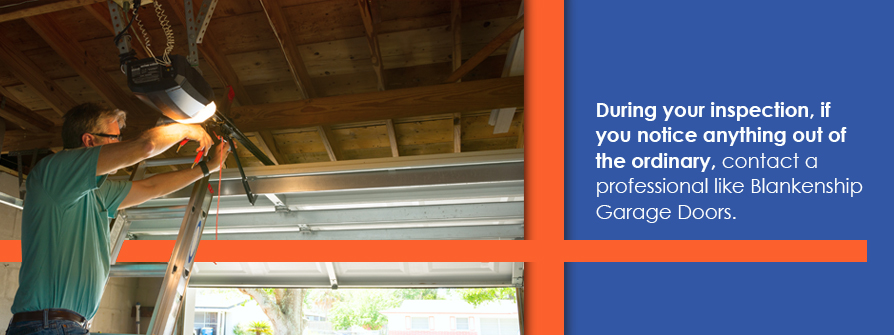
Why You Should Trust Blankenship Garage Doors to Repair Your Garage Door
Any of the above garage door problems can cause major frustration. As a preventative measure, you should perform annual garage door maintenance to identify any potential issues before they get worse. Start with a visual inspection of the whole garage door system, looking for anything that may need a closer look, cleaning or repair. Next, open the door, watching and listening for any strange noises or imbalances in the way the door goes up.
During your inspection, if you notice anything out of the ordinary, contact a professional like Blankenship Garage Doors. Some fixes are easy — like new batteries for the remote garage door opener — but many garage door repair jobs are best left to experienced professionals.
Online videos and how-to articles make home repair look easy, but these resources are often made by seasoned experts. In reality, repairing a garage door is often no easy task and can be downright dangerous if you don’t have the right experience. Professional garage door technicians know how to complete repairs correctly and safely. They can also complete quickly, saving you loads of time as well as frustration.
Professional garage door repair technicians know how to check all power sources and secure garage door parts before proceeding with any repairs to ensure the safety of everyone around. Garage doors have many complicated parts that can be difficult to repair and pose unique safety hazards. It’s also important to note that if your garage door is under warranty, the warranty may be voided if you attempt some of the repairs yourself. It’s best to keep your warranty and save yourself the hassle by having your garage door repaired professionally.
At Blankenship Garage Door, our team of highly trained technicians have years of experience, so you know they’ll do the job right. We guarantee all of our work and even schedule repairs outside of normal business hours to provide the most flexibility and convenience for our customers. Schedule an appointment that works for you, and our technicians will arrive on time and fix your broken springs, rollers or cables or other problems. We’ll get to the bottom of your garage door issue and fix it right the first time.
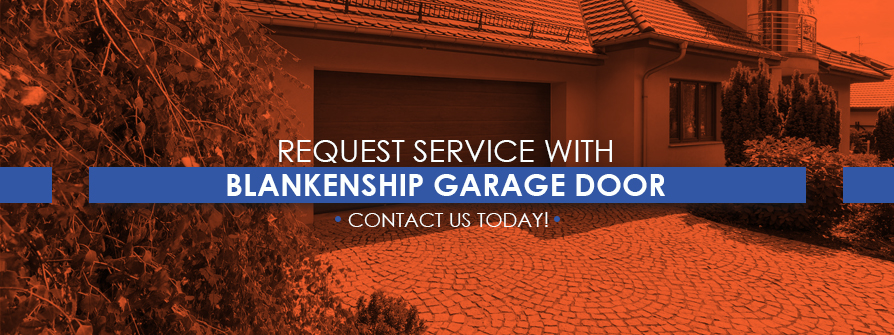
Request Service With Blankenship Garage Door
When your garage door needs maintenance or repairs, hire the very best. The experienced staff at Blankenship Garage Door are ready to take your service request and schedule a repair appointment that works for you. We’ve been providing premium service to both residential and commercial clients in Central Oregon for more than 20 years. Just fill out our quick and easy online service request form, and we’ll get back to you to schedule a convenient appointment to get your garage door back on track.
Why Garage Door ‘Do It Yourself’ Repairs are a Bad Idea
Why DIY Garage Door Repair Is a Bad Idea
Many homeowners enjoy the challenge of do-it-yourself home improvement projects. Taking on the right job independently can save you money and provide entertainment, as well as a sense of accomplishment. However, some projects are best left to professionals — garage door repair is one of these.
When garage door problems arise, you might be tempted to try and fix it yourself, but DIY garage door repairs can be both difficult and dangerous. Here are four serious reasons you should call a professional instead of trying this project on your own.
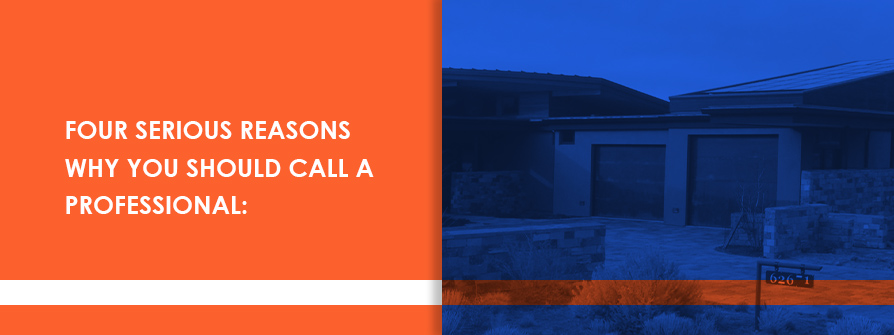
1. You Could Make the Problem Worse
Garage door openers are complex mechanisms. Unless you’re trained as a garage door repair technician, you likely don’t have the knowledge and experience necessary to tackle this type of home improvement project. Incorrectly installed components like garage door springs can cause major damage to your garage door cables and other components posing major safety risks and increased financial requirements.
If you try to repair your garage door yourself and accidentally use the wrong parts or methods, you could end up making the problem worse. Some mistakes could even ruin your garage door and require you to buy a new one. It’s best to hire a professional with the experience necessary to get the job done right the first time.
2. You Might Not Have the Proper Tools
Repairing a garage door takes specialized tools and components. If you try to fix the door with what you have on hand, you risk damaging the door, as well as your own tools.
Without the proper tools, garage door repair will be difficult, if not impossible. A good technician can provide all the tools necessary to fix the problem without hassle or risk.
3. You Could Lose Your Warranty
When you first purchased your garage door, you were likely given a warranty for a certain amount of time. That warranty can help you pay for repairs and replacement if something goes wrong before the specified time has passed.
When you attempt do-it-yourself repairs on your garage door, you give up any warranty you may have had. This is because warranties are not meant to cover any modifications consumers make to the product after it’s installed. To keep your warranty — and maybe even make use of it — you should only allow a professional repair company to work on your garage door.
4. You Could Get Hurt
The biggest reason you shouldn’t try to DIY repair your garage door is that it’s dangerous. Garage doors weigh several hundred pounds, and it can come down with enough force to cause serious injury. Technicians know how to work with these heavy doors carefully, but most homeowners don’t.
The springs used in garage door systems also pose a significant danger. To hold up such a heavy door, overhead springs hold a lot of tension. If these springs break during repair, they release that tension and send pieces flying with a force that could be fatal. So, you should never try to fix or replace a torsion spring on your garage door by yourself. While other garage door parts may seem less dangerous like your cables, keep in mind these parts all work in unison to support the weight of your garage door and shouldn’t be seen as a light repair.
Get Help From a Repair Professional
Because repairing a garage door can be difficult and dangerous, it’s a good idea to get help from a professional instead of tackling the project yourself.
At Blankenship Garage Doors, we’re dedicated to providing our clientele with excellent service. We proudly serve Bend, La Pine, Madras, Redmond, and surrounding areas of Central Oregon. Our experienced team can repair your garage door safely and quickly. Call Blankenship today to learn how.
Does Your Garage Door Need Repaired?
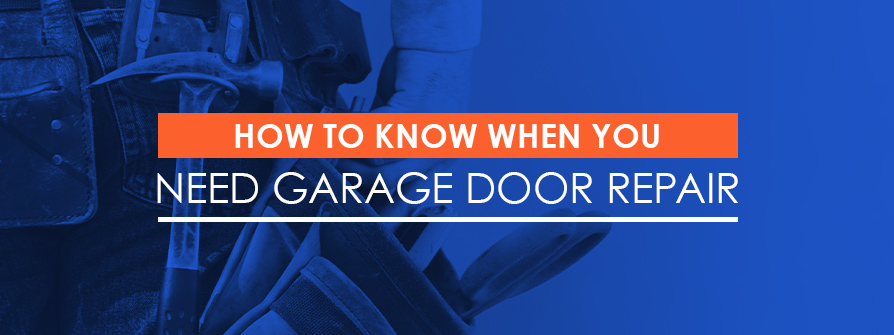
How to Know When You Need Garage Door Repair
Is your garage door not operating as smoothly, efficiently and reliably as it used to? Most homeowners use their garage doors every day to easily leave and enter their homes. But with constant use, experiencing garage door wear and tear is normal. The best way to know when you need garage door repairs — to prevent inconvenient and potentially hazardous garage door breakage — is to note any unusual operation or sounds that may indicate trouble.
Do You Need Garage Door Repairs?
While garage doors are designed and constructed to perform dependably for up to 20 years with proper maintenance and care, damaged hardware can occur over time. As you notice operational issues, address these needs quickly to reduce emergency repair costs and prevent inconvenient events that could leave you stranded outside your garage.
To know whether you need garage door repair, note the following signs:
- Noisy Door Operations: Garage doors usually make noise while operating, so how can you tell when the sounds from your door or opener are unusual? While using your garage door, listen for any unpleasant sounds like straining, grating, rubbing or grinding. These could indicate damage to your garage door opener motor or worn and loose pieces of hardware, like the rollers or springs.
- Door Won’t Open Manually: While you may not have to manually open your garage door often, being able to do so is crucial in cases of door failure or during a power outage. If you cannot easily lift your garage door by hand, then you may have issues with your spring system. Springs are responsible for counterbalancing the weight of your door and ensuring smooth and simple opening and closing. They typically last up to 10 years.
- Slow Door Response: After sending a command to your garage door, it should respond without delay within two seconds. If your door hesitates to raise and lower when instructed, it could indicate that your remote battery is dead, a malfunction with your remote or a damaged opener.

- Sagging or Off-Balance Garage Door: Check if there are gaps beneath the door or if it is visibly sagging. Garage doors with gaps beneath the seal could indicate misalignment, an improperly installed door or uneven spring wear. These damages could lead to minor issues like damaged hardware or serious, unexpected breakages. One way to check the condition of your door is by performing a balance test: unlatch your door from the opener and lift the door halfway on its track. If the door springs open or closed, the door is off-balance.
- Dented or Damaged Door Panels: Damaged garage doors aren’t only unattractive, but can also affect the overall quality and functionality of your system. Dented garage door panels could cause affect your door’s alignment and overall door balance, cause strain on other parts and hardware and damage the track, eventually leading the door to become off-track.
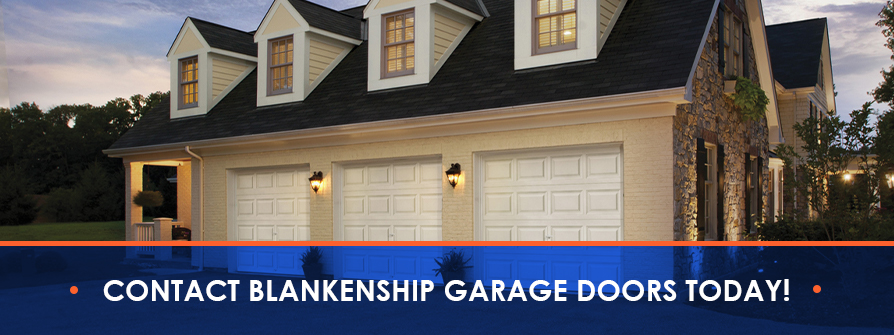
Blankenship Garage Doors: Central Oregon’s Most Trusted Garage Door Repair Specialists
For the most experienced, friendly and efficient garage door repair and maintenance services throughout the Central Oregon area, rely on the professionals at Blankenship Garage Doors. We have over 20 years of garage door servicing experience and are dedicated to providing all of our local customers with the most reliable, affordable and personalized repair solutions. Schedule garage door repair services today by completing our online service request form or call 541-383-2658 to speak to a team member.
